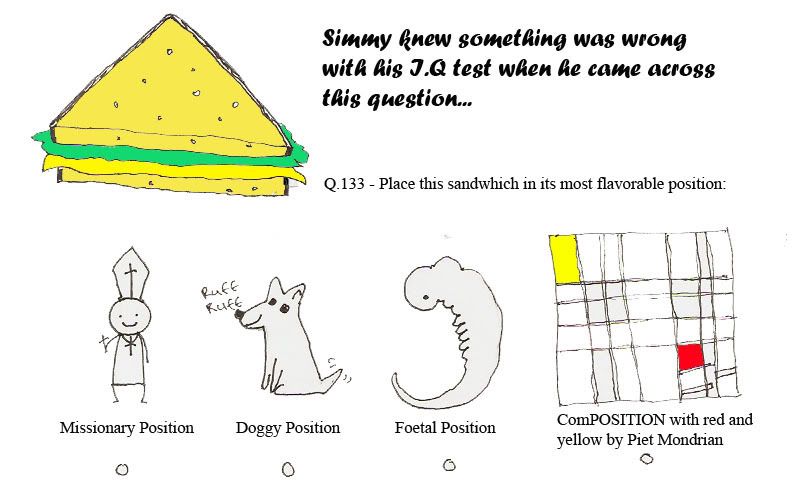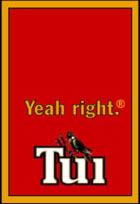Intelligence Quota
Monday, October 6, 2008I.Q tests were developed during the 1920s by French psychologists in an attempt to categorize French children into different groups of intelligence. The French I.Q test for children was taken and then bettered by American psychologists, who then produced a method of I.Q testing which most people are familiar with today - a version which has been described as one of the most influential scientific inventions of this century (trust the Americans to take the credit).
How the scoring works is that the participant's number of correct answers is compared to the average expected score of someone their age, this score is then multiplied by 100 which is only don to make the number prettier and more rounded. For instance:
participants score = 10
expected score = 10
ps10 / es10 = 1
1 x 100 = 100 , thus the participant has an I.Q of 100.
This I.Q of 100 is also the statistical average I.Q of the human population, and most people tend to lie between 90 - 110. I myself have an I.Q of 132 (as of 2005, but I have lost many a braincells since then). Frankly I think using and I.Q test to measure one's intelligence is stupid and completely inaccurate (as seen by my result) as there are many different types of intelligence most of which aren't tested under traditional I.Q tests.
Bodily-Kinesthetic
This area has to do with movement and doing. People are generally good at physical activities such as sports or dance and often prefer activities which use movement.Interpersonal
This area has to do with interaction with others. People in this category are usually extroverts and are characterized by their sensitivity to others' moods, feelings, temperaments and motivations, and their ability to cooperate in order to work as part of a group.Verbal-Linguistic
Verbal-linguistic intelligence has to do with words, spoken or written. People with verbal-linguistic intelligence display a facility with words and languages.Logical-Mathematical
This area has to do with logic, abstractions, inductive and deductive reasoning, and numbers.Naturalistic
This area has to do with nature, nurturing and relating information to one's natural surroundings. This is the eighth and newest of the intelligences, added to the theory in 1999.Intrapersonal
This area has to do with introspective and self-reflective capacities. Those who are strongest in this intelligence are typically introverts and prefer to work alone.Visual-Spatial
This area has to do with vision and spatial judgment. People with strong visual-spatial intelligence are typically very good at visualizing and mentally manipulating objects.Musical
This area has to do with rhythm, music, and hearing. Those who have a high level of musical-rhythmic intelligence display greater sensitivity to sounds, rhythms, tones, and music.There is also suggestion of an emotional intelligence, but this seems to be contrite effort to be P.C and provide a way for every dumbass to feel that they are intelligent in one way or another. Lets just stick to the most reliable source of intelligence measurement : NCEA.
4 Witty Remarks:
- Eeli said...
-
Well i think i'd answered your question in my previous comment. Harry Potter magic of course! But i wouldn't know myself since you're the one with this sixth sense ability to see all our magical capabilitie so you tell me!
I see you're honing in on Mrs Mary Poppins turf. I think theres some copyright infringement there. Unless you spelt it incorrectly which i'm certain you did. Woah, what a lucky shortfall there.
Change will happen. I will do an androgyny inspired outfit for you sometime. Maybe you can then join and do the same. I do not know how you look but i'm sure you dressing like a femme would be a riot regardless
I like your resurection of this Adam character. Laughed at the short Lord of the Rings parady below. Very funny indeed - October 08, 2008
- Maria Karla said...
- This comment has been removed by the author.
- October 11, 2008
- Maria Karla said...
-
Honestly, does IQ still matter in education in NZ?
I used to believe in those stuff. - October 11, 2008
- Sim said...
-
In industries or areas where you only have a limited amount of positions available, you might have a large number of applicants who have the same degrees, or the same results in school and you need to pick one. An effective way to do that is administrating an I.Q test along with an EPI (Eysenck Personality Inventory) which is a personality test. Together they can tell you how capable a person is of solving puzzles, looking at situations and assesing them, and how they cope in different situations. Sure they can be easily fooled, and arent accurate, but its a faux-solution that works, and itll be used until we find something more concrete.
- October 12, 2008


